Contribute
| India Vedic Period (2000BCE – 700BCE) – Philosophy And Religion |
Satyendra Sharma
02/25/2021
Veda means knowledge. It is a collection of empirical suggestions how a person may conduct life with his/her religious obligations. The Vedas are prescriptive for a person of Hindu faith even today. The Vedic period suggests a period in which people gave more time to contemplate on the day-to-day events, changing seasons, night sky and general surroundings. Rig(praise)Veda samhitÄ mostly consists of hymns addressed to various gods or– Agni, Indra, Varuna, Ashwini Kumaras, Soma, Vishvedevas, Rudras etc. Hymns were offered to please them for fulfillment of the desires and seek protection. Vedic Philosophy Rigveda contains inquiry regarding the cosmology and origin of the universe (NÄsadiya sÅ«kta). The questions like what existed before the sat (perceivable) and asat (unperceivable), what covered the space and beyond are analyzed. There is no definitive answer given in the text regarding these inquiries. The concept of the universal order or rta is inferred as an explanation. Partaking soma, a plant extract, was considered auspicious. The relationship of soma extract to (Chandra or moon god) was possibly the connection of harvest to the lunar cycle. This relationship points to the belief in animism (chetanavÄda). Many of the hymns in Yajurveda that are addressed to yajna equipment like vedi (altar), yupa (post), havi (offerings) etc. are examples of animism. Figure 4 The Ä€ranakyas, the literature developed through secluded forest living, contain discussion on the nature of Brahman. This forms the content for Upanishads also referred to as VedÄnta. The ultimate goal of the human life is to realize the identity of individual soul Ätman and the brahman. The institution of realized preceptors in student training has remained as a practice in India. Vedic Religion The very first SÅ«kta (verse) of Rig Veda is addressed to Agni who is the facilitator for the other gods who are invoked during the Vedic ceremonies. Agni is considered to be pure and carrier of everything in it. Agni is an essential element for all yajna (symbolic surrender of all possessions) processes where the oblations are made to the gods. Rigvedic and SÄmavedic rituals contain a common theme of offering soma juice mixed with dadhi (yogurt), ghrita (clarified butter), madhu (honey), milk and water to the gods. There are different interpretations of the offering of animals during yajna process. The animal sacrifice interpretation arises from the word medha which would mean killing. SÄmaveda is the musical (sÄman) rendering of the hymns in praise of the gods mentioned in Rigveda. SÄma has two parts – Archic (related to rk or praise) and GÄna (melody). Atharvaveda mostly contains hymns for removal of maladies or for the fulfillment of desires. The sÅ«ktas in Atharvaveda deal with formulas to counteract diseases and ward off evil. This might be an example of influence of Tantric practices in these vedic hymns. Other Religions People outside the Vedic area had their own belief system based on rivers, mountains, earth, demons and snakes. Many of the ideas were gradually absorbed into the Vedic fold in time. Conflicts between the cultures are reported in the literature. Fig 1. – Vedic Text on palm leaf (recorded 300CE) 1. Hindi Rig Veda – Shakal Samhita – R.G. Trivedi, Indian Press, Prayaga, 1954 2. Yajurveda – Bhagavati Devi Sharma – Yug Nirman Publications, 2014 3. Athravaveda Samhita – Charles Rockwell Lanman -Harvard Oriental Series, 1905. 4. Samveda - Bhagavati Devi Sharma – Yug Nirman Publications, 2014 5. Four Vedas – English Translation – R.T. Griffith, A.B. Keith and M. Bloomfield. Internet Archives – Archive.org. 6. https://wellcomecollection.org/ 7. Wikipidia.org 8. Vedic Heritage – www.vedicheritage.gov.in ---------------------------------------------- Dr. Satyendra Sharma leads the Philosophy and Religion track in India Discovery Center's project on "Evolution of Indian Culture: Pre-history to 1947AD". More information and updates on the project are available at https://www.facebook.com/Evolution-of-Indian-Culture-An-IDC-Project-107749391111922 Information on India Discovery Center is at https://www.indiadiscoverycenter.org (c) Copyright 2021 India Discovery Center, Inc. All rights reserved.India Vedic Period (2000BCE – 700BCE) – Philosophy and Religion
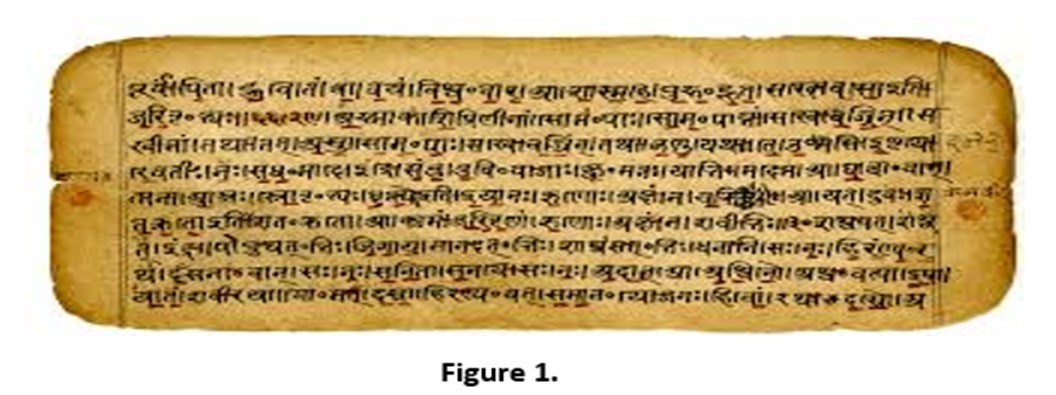
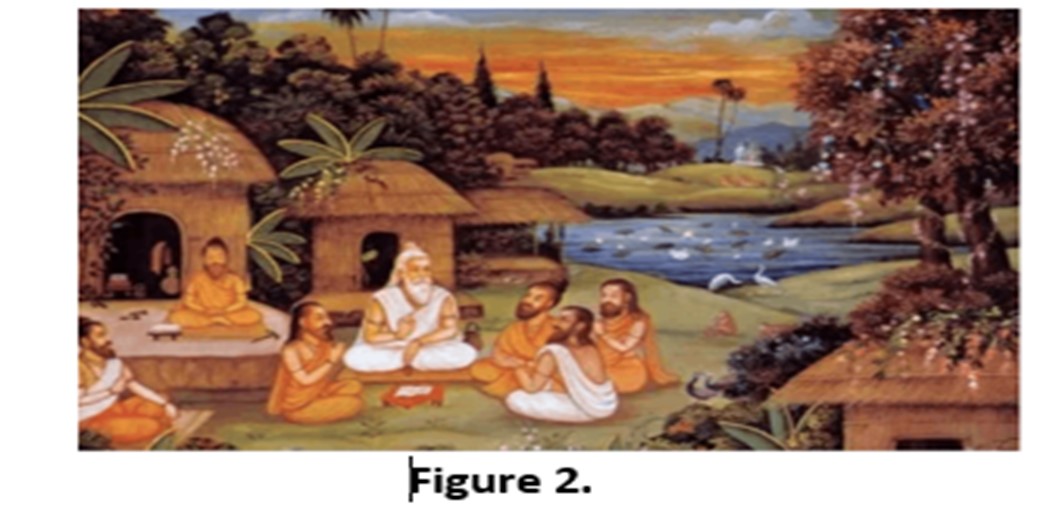
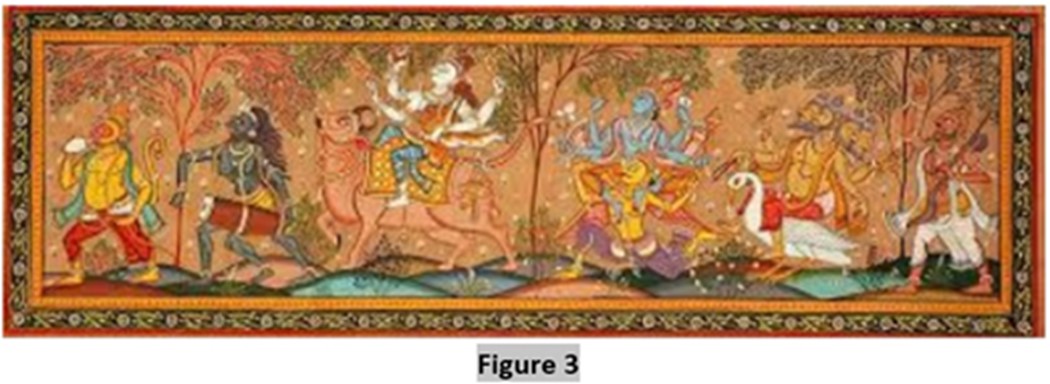
Udgitha in SÄmaveda is practice of chanting of divine syllable Om. Om is also considered as akshara brahma, meditating on which was a pathway in realizing the ultimate reality (Brahman). The concept of a universal all-encompassing Brahman was the final postulate of the Vedic period. 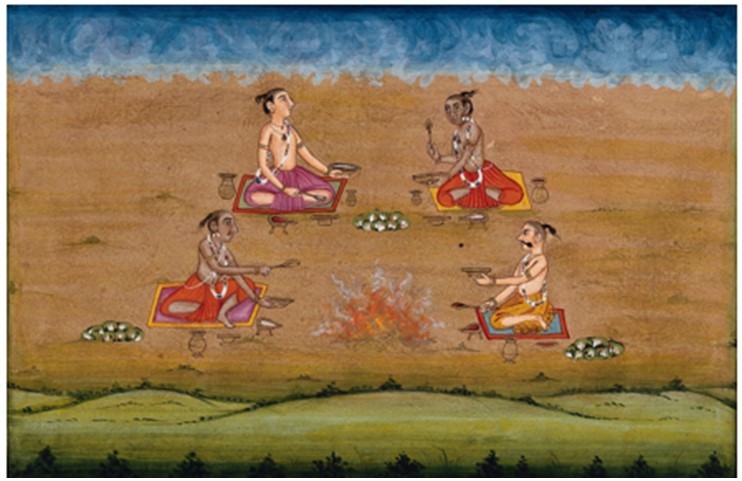
Atharvaveda is a text devoted to occult practices. Some of the sūktas deal with the cosmological questions including nature of existence. The Skambha sūkta addressed to the brahman that can be attained by contemplating on tatva traya – cit, acit and ishvara (soul, matter and God). 
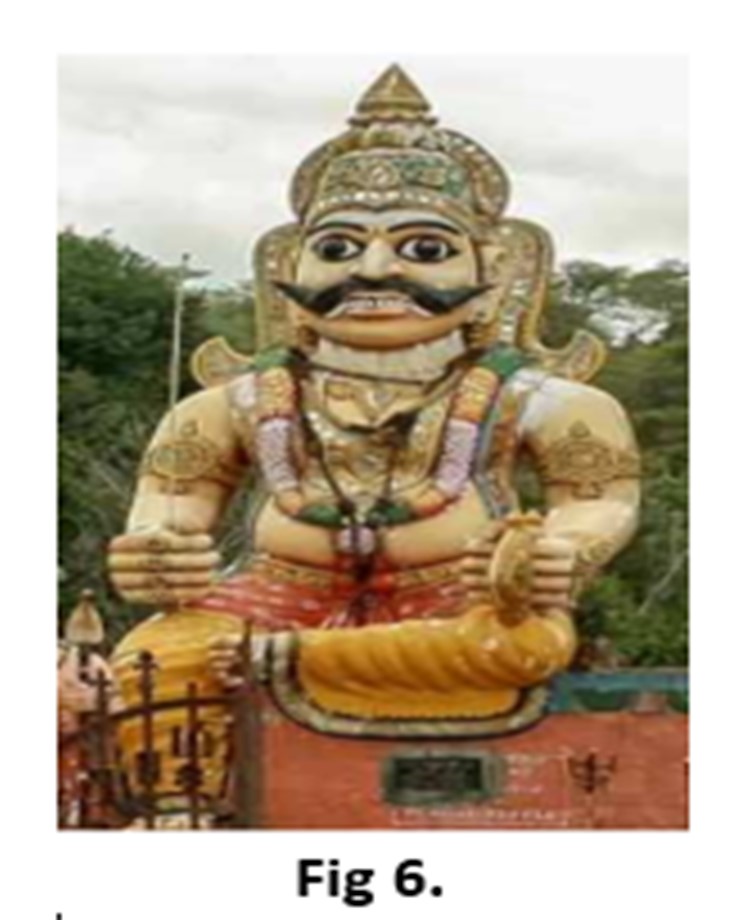
Fig 2. - Dissemination of the Vedic hymns
Fig 3. – Vedic gods
Fig 4. – Upanishad – teacher and student
Fig 5. - Yajna tools
Fig 6. – Ayyanar – a folk deity
You may also access this article through our web-site http://www.lokvani.com/






